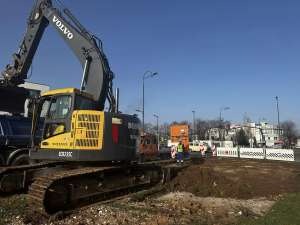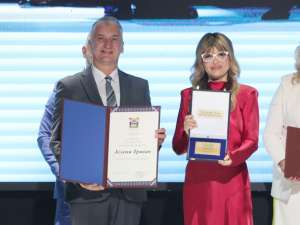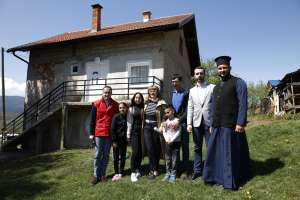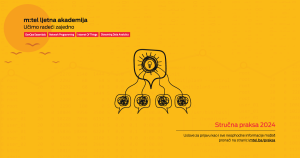SARAJEVO, May 12 (FENA) - My message from Kiev was that the European spirit is far more present in Ukraine than in most of the main capitals of Europe itself. My message was also to say that I was there, among the rebels of Maidan in 2014, and that there was more faith in Europe, more hope in Europe, more European ideals among the rebels of Maidan than among the big spoiled children of old Europe. In a way, I come to Sarajevo to say the same thing, said in an interview with FENA renowned French philosopher and writer Bernard-Henry Lévy ahead of his visit to Sarajevo.
Tomorrow, at 9:15 p.m., his play "Looking for Europe" will be staged at the National Theater in Sarajevo. As part of his tour in twenty European cities before the elections for the European Parliament, he chose two cities from non-EU countries: Kiev and Sarajevo. Explaining the kind of message that he wanted to send out to the EU and its citizens from Kiev, he now talks about what kind of message he wants to send from Sarajevo.
"I know Sarajevo very well, I know how much Sarajevans are disappointed with the attitude of Europe towards them. I know that Sarajevans, whom we are constantly sending out to wander between false promises and false hopes, eventually are starting to lose their faith in Europe. And I know that there is melancholy in Sarajevo, which is painful to me. But my message is, however, that the spirit of Sarajevo, the one I knew 25 years ago, and the one that still soars over the city, is just an example of what Europe should be.
My message, therefore, is that it is urgent to start talks on Bosnia and Herzegovina's accession into the European Union. It is really urgent. It is urgent to stop this comedic act of well-known "suspensive conditions" and I repeat it constantly, in France and elsewhere, that it is a pure scandal! I say to Europeans: "Look over to Sarajevo, it is from there that the positive European breeze comes from".
I tell Sarajevans: "Do not despair - I know it is easier said than done, but please, my brothers in Sarajevo, do not despair, I am among many who believe that the doors of Europe will have to open for you" emphasized Lévy.
Commenting on the fact that Europe, in official speeches, always proclaims diversity, respect for others and different, but that the term "Christian Europe" is heard more and more, Lévy says that this is not only related to the past of the European continent, and that there are other reasons which contribute to such a discourse.
"Unfortunately, there are other reasons. And these other reasons, of course, stem from the rise of the saddest forms of nationalisms, the most fascist ethnicities and the most primitive populisms. It is the wind that is currently blowing in Europe. It is the wind of populism. And in the wind of populism, you have this idea of exclusively Christian roots of Europe. I repeat, exclusively Christian.
For us to say that Europe has Christian roots, there is nothing to object to this statement. It has Christian roots, as it has Jewish and Muslim roots as well. However, today there is a tendency to ignore or even erase the two latter ones, in other words, to deny these Jewish and, above all, Muslim roots. There is a tendency to forget all the contribution that Muslim culture has given to Europe. Of course, this is not acceptable. This is where we find these great ideologists of "great replacement", the "flooding" of Europe by the non-European population, who are the authors of these intellectual constructions and deceptions.
The text of my play, in all the cities in which it was shown, targets precisely this idea, these mistakes, and this filth," says this French philosopher.
He points out that the response to the emergence and strengthening of anti-Semitism in Europe is not adequate and that it is far from sufficient.
"I was thinking about demonstrations in Paris a few weeks ago and antisemitic acts of some members of the yellow vests movement in Paris. There was this protest where thousands of people gathered. That was good. But, it is such a contrast to the protests of the 1980s, when there were dozens or even hundreds of thousands on the streets! Today you have people who enter the house of an old woman, a Jew and stab her with a knife. They stab her! Or they throw people of windows and kill them! Of course, at that moment, people were outraged. People said it was just so sad, especially to kill the elderly, and so on. But real anger, the real feeling of horror, no, I did not see that. The play at one point speaks about this issue. I'm talking about the fact that people were more outraged by trivial things like the skiing weekend of Emmanuel Macron as the protests were happening," explains Lévy.
He believes that Europe is not aware of the fact that extreme, right-wing terrorists that have sown death in the West, from the Utoya case in Norway to Christchurch in New Zealand, have drawn their inspiration from Radovan Karadžić and the ideology he has implemented in Bosnia and Herzegovina, which still has its political followers here and that the war in BiH was the first and greatest terrorist act, and that the advocated division of BiH was precisely a part of it.
"This is one of the main reasons why I wrote this play! You will see. You will hear. This is exactly what I'm going to say on the stage in Sarajevo. The hell machine was jumpstarted in Sarajevo. And, with our consent to start this hell machine, something dreadful has been triggered.
For this reason, we pay the consequences in the United States, in Australia and in Europe, and the attacks are a part of that. This ideology of white supremacy, this hatred towards the Muslims, these attacks in the name of a fantasy of the so-called "great replacement," it is all an ideology of ethnic cleansing, it is the genocidal ideology that Mladić and Karadžić implemented, which now comes back to us Europeans, backfiring in our faces. There is a Bosnian model, a prototype of a kind. This prototype was developed on the hills of Sarajevo, in Pale, from 1992 to 1995. And, like all prototypes, it is multiplying, it is cloning itself. Now, these clones are coming back on us, the Europeans, once again, like some kind of terrible and tragic boomerang," warns Bernard-Henry Lévy.
Asked about what led him to write the text for the play "Looking for Europe," after so many intellectual battles he led in the past, and what was the reason he has been so deeply engaged in such and similar topics for many years, ever since his early youth, Lévy said that writing such a text was truly a kind of a crazy marathon to him.
"It has been a physical, intellectual, an utterly mad challenge that I have imposed on myself because to do adaptations of the same piece twenty times, and I perform it for two hours in theaters across of Europe, you shall see, it is an incredible athletic performance. But why, and for what? Precisely because of all the problems we have mentioned. Because I believe that now it is high time for Europe, and if we do not act, we are heading towards a great disaster.
The European campaign has already begun here for several weeks now, it is taking place throughout Europe, and we do not care. No one is campaigning. Therefore, I have decided to conduct my own campaign. The same as I did in the time of the "List for Sarajevo", in 1993, you remember, I led the campaign without being a candidate.
That is how I work. Why I do it so, I do not know. This is perhaps what we mean when we speak about engaged intellectuals - the contribution of those who do cannot tolerate injustice, who believe that the real disorder is found in the obvious injustices done to the people we exclude or we condemn them to ruin. I do not like the idea that here on Earth there are those that we condemned to ruin. I am always on their side. Wherever they are. On any continent," says Lévy.
He stresses that Bosnia and Herzegovina, has long ago to returned the favor and paid him back, for standing with the country in its most difficult moments, for supporting BiH on its EU and NATO path and for having been a true friend of this country.
"All that Bosnia could feel like a kind of debt to its friends, as I consider myself to be one, has been paid back a long time ago! When President Alija Izetbegović handed me a reward, a recognition I received in the bombed building of the Presidency in 1993 or 1994, for me it was one of the greatest moments in my life and, certainly, the greatest honor I have ever been given.
When, a few years later, the City of Sarajevo declared me an honorary citizen, I felt the same. I could not have been more honored; the City of Sarajevo said it in the clearest way and the most beautiful way possible that it considers me as one of their own!
And on Monday night, at the National Theater, when my friends are there, it will be the same. It will be the greatest honor I could be given. This, in fact, will be the best way of acknowledging all those little things, the small things that I have been doing for Bosnia for the past 25 years. You need to know one more thing. At one point in the play, I say that in the political history of the twentieth century, there were two angelic personalities. Not three but two. And these two personalities are Václav Havel and Alija Izetbegović. I truly believe this is so. And the fact that I was strengthened by their personalities in my life, especially with the friendship of Alija Izetbegović, there has been no greater honor for me. The debt that really still exists is another kind of debt. It is a debt that Europe has towards Bosnia. There is that debt that has not been repaid. We, the Europeans, have a debt towards Bosnia that carried our colors, even when it was under bombs. That is my concern, and that is what I am thinking about today. It is to this I have dedicated my strength. And that is why I am coming back; this time to the National Theater in Sarajevo on May 13," concluded Bernard-Henry Lévy.
(FENA) S. R.











